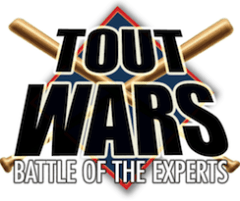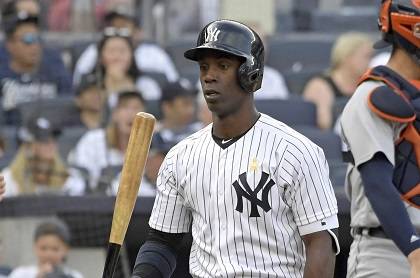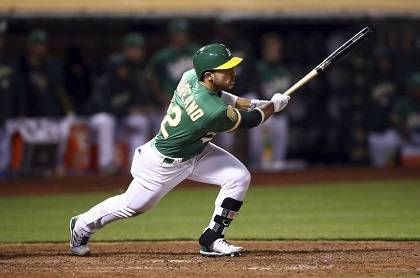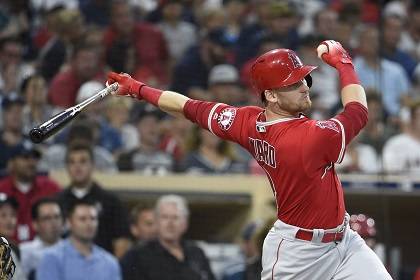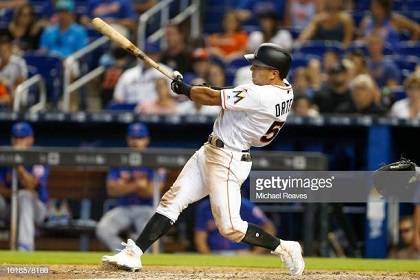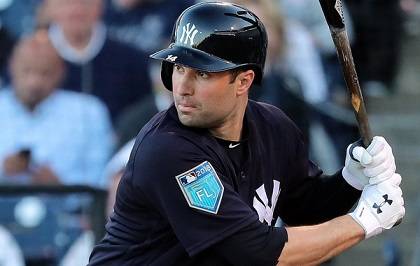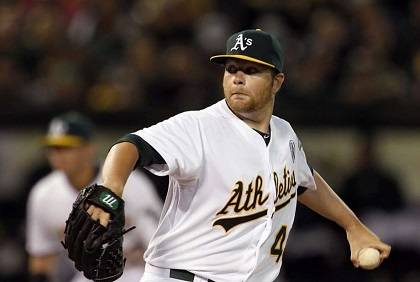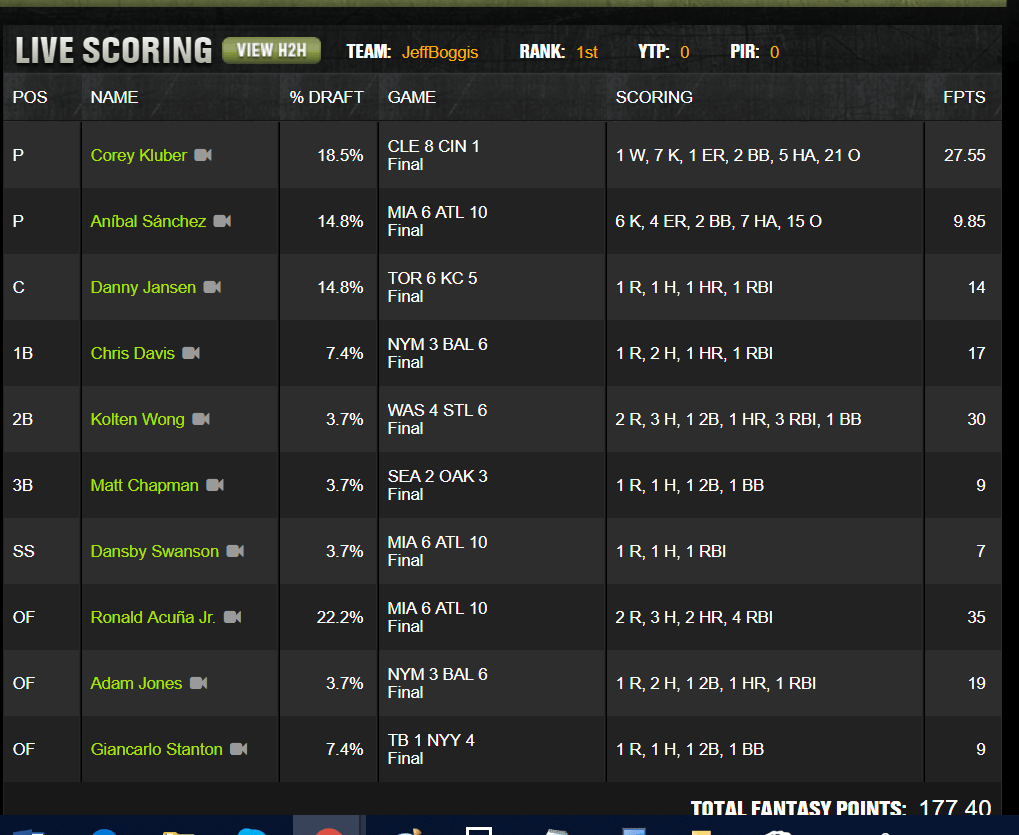Welcome to the weekly Tout Wars FAAB report, on its new home right here on the Tout Wars site. Each week, we’ll review the free agent acquisitions from all five leagues, with commentary from a league member, as well as yours truly.
We changed the timing of the weekly run to 1 PM ET every Sunday, with the report posted later that afternoon so you’ll have time to digest and apply to your own leagues. In addition, I’ll be joining Lawr Michaels and Justin Mason on the Tout Wars Hour on the FNTSY Network every Sunday at 3:20 PM ET to discuss the results.
You can find the complete list of Tout Warriors here. Everyone starts with 1000 FAAB units, less any penalty incurred by finishing below a designated point in the standings. This is a means of keeping everyone motivated to keep playing all season long. The minimum bid is $0. FAAB units can be traded as well as rebated for players released off the DL. The report will list all winning bids along with unsuccessful tries and contingencies. This provides the maximum level of information to help gauge interest on the players.
The American and National League only formats are 12-team leagues, as is the new points-based head to head league, The Mixed Auction and Draft each have 15 clubs. All the leagues have four reserves with an unlimited DL, expect the head to head league, which allows six reserves. The headings above each league are links to publicly accessible sites where you can see standings, roster and a complete review of transactions. The initial auctions and drafts can be found here.

SUCCESSFUL BIDS
| PLAYER | WINNING BID | ||
| JrgLopez, KC | Doug Dennis 100 | Seth Trachtman 45 | |
| ADiaz, Tor | Doug Dennis 83 | Rick Wolf/Glenn Colton 11 | |
| YMendez, Tex | Seth Trachtman 45 | ||
| JMFernandez, LAA | Rick Wolf/Glenn Colton 11 | ||
| BGuyer, Cle | Rick Wolf/Glenn Colton 1 | Rick Wolf/Glenn Colton 6 | |
| JRickard, Bal | Larry Schechter 1 | ||
| TButtrey, LAA | Larry Schechter 0 |
UNAWARDED BIDS
| PLAYER | |||
| DCovey, CWS | Seth Trachtman 11 | ||
| RTellez, Tor | Larry Schechter 1 | ||
| TScott, Bal | Doug Dennis 0 |
Todd’s Take
Geez, what does a guy have to do to get noticed, carry a perfect game into the ninth? Jorge Lopez followed up a seven inning, one run outing versus the Orioles, fanning eight with no walks with his gem versus the Twins. The former Brewers prospect spent much of the 2018 campaign working as a reliever. With 15 innings allowing just two runs this last two efforts, Lopez is making a strong case to be in the Royals rotation next season.
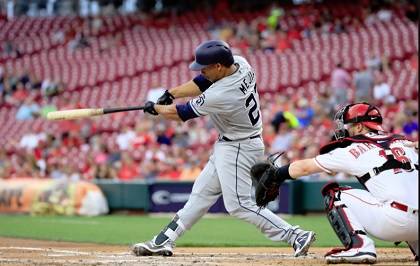
SUCCESSFUL BIDS
| PLAYER | WINNING BID | ||
| FMejia, SD | Mike Gianella 65 | Todd Zola 29 | Steve Gardner 15 |
| Craig Mish 3 | Tristan H. Cockcroft 0 | ||
| PWisdom, StL | Mike Gianella 65 | Todd Zola 29 | |
| JRoss, Was | Mike Gianella 65 | Phil Hertz 60 | |
| JOsuna, Pit | Todd Zola 29 | ||
| TGore, ChC | Phil Hertz 25 | Phil Hertz 4 | |
| TomHunter, Phi | Steve Gardner 15 | ||
| SKieboom, Was | Mike Gianella 0 | Steve Gardner 0 | |
| AAvila, Ari | Steve Gardner 0 | Mike Gianella 0 | |
| JHicks, StL | Tristan H. Cockcroft 0 | Steve Gardner 4 |
UNAWARDED BIDS
| PLAYER | |||
| FPena, StL | Mike Gianella 0 | ||
| PSeverino, Was | Mike Gianella 0 | ||
| TNido, NYM | Mike Gianella 0 | ||
| DHudson, StL | Tristan H. Cockcroft 0 | ||
| KGlover, Was | Tristan H. Cockcroft 0 | ||
| KWright, Atl | Tristan H. Cockcroft 0 |
Todd’s Take
In a bit of a switch, hitters dominated the NL bidding with Francisco Mejia paving the way. The jury is still out with respect to his defense; his stick is MLB ready.
Next up is Cardinals third-sacker Patrick Wisdom, called up to help an injury-riddled infield. As an example of how thin the hitting ranks are, Wisdom is just 6-for-31, albeit with half of his knocks leaving the yard. But, playing time is currency and he’s seeing regular run.
Without the budget to compete with Mike Gianella, I settled for Jose Osuna, hoping he plays down the stretch. Not-so-ironically, he’s replacing the same guy he’s replacing in Pittsburgh, Gregory Polanco.

SUCCESSFUL BIDS
| PLAYER | WINNING BID | ||
| JCandelario, Det | Scott Swanay 81 | Ron Shandler 27 | |
| FMejia, SD | Jeff Zimmerman 32 | Tim Heaney 3 | Al Melchior 0 |
| SAlcantara, Mia | Ron Shandler 27 | Scott Swanay 81 | Fred Zinkie 4 |
| KYates, SD | Jeff Zimmerman 24 | Zach Steinhorn 6 | Al Melchior 1 |
| RTellez, Tor | Jeff Zimmerman 24 | ||
| JGray, Col | Jeff Zimmerman 24 | Ray Flowers 21 | Al Melchior 1 |
| BKeller, KC | Ray Flowers 20 | ||
| AFrazier, Pit | Ray Flowers 19 | Al Melchior 0 | |
| YGurriel, Hou | Ron Shandler 19 | Jeff Zimmerman 24 | Zach Steinhorn 2 |
| JRoss, Was | Ron Shandler 5 | ||
| VRobles, Was | Tim Heaney 3 | ||
| CStewart, Det | Jeff Zimmerman 2 |
UNAWARDED BIDS
| PLAYER | |||
| CStratton, SF | Ray Flowers 19 | ||
| LBrinson, Mia | Ray Flowers 19 | ||
| MMahtook, Det | Ray Flowers 19 | ||
| HDozier, KC | Ron Shandler 11 | Jeff Zimmerman 0 | |
| WDifo, Was | Ron Shandler 5 | ||
| TomHunter, Phi | Jeff Zimmerman 4 | ||
| DFletcher, LAA | Jeff Zimmerman 0 | ||
| DTravis, Tor | Jeff Zimmerman 0 | ||
| JChoi, TB | Jeff Zimmerman 0 | ||
| YMunoz, StL | Jeff Zimmerman 0 |
Todd’s Take
Frequent helper Jeff Zimmerman was a busy man, reacquiring Jon Gray among several other moves. The two I want to focus on are Rowdy Tellez and Christin Stewart, both options to provide some late season pop. Tellez has replaced the slumping Justin Smoak at first base. After hitting safely in his first four games, Tellez was 0-for-4 om Sunday but still should receive a good look the next three weeks. Stewart will be the Tigers everyday left fielder down the stretch, after hitting 23 homers for Triple-A Toledo this season.

SUCCESSFUL BIDS
| PLAYER | WINNING BID | ||
| FMejia, SD | Perry Van Hook 123 | ||
| RDavis, Cle | Anthony Perri 60 | ||
| DFletcher, LAA | Anthony Perri 60 | Rudy Gamble 27 | |
| AFrazier, Pit | Rudy Gamble 42 | Adam Ronis 28 | |
| AGomber, StL | Charlie Wiegert 37 | D.J. Short 15 | |
| RLaureano, Oak | Charlie Wiegert 37 | Adam Ronis 28 | |
| LVoit, NYY | Adam Ronis 28 | ||
| WChen, Mia | D.J. Short 20 | ||
| SAlcantara, Mia | Perry Van Hook 3 | D.J. Short 8 | |
| JAlvarado, TB | Gene McCaffrey 1 | ||
| RTellez, Tor | Gene McCaffrey 0 | Adam Ronis 28 | |
| CIannetta, Col | Gene McCaffrey 0 |
UNAWARDED BIDS
| PLAYER | |||
| SSchebler, Cin | Adam Ronis 28 | ||
| ENunez, Bos | Rudy Gamble 22 | ||
| FPena, LAA | D.J. Short 15 | ||
| BLowe, TB | Adam Ronis 13 | ||
| BMcKinney, Tor | Adam Ronis 4 | Gene McCaffrey 0 | |
| JRoss, Was | Perry Van Hook 3 | D.J. Short 1 | |
| FValdez, Hou | Perry Van Hook 3 | ||
| JBeeks, TB | Perry Van Hook 3 | ||
| JrgLopez, KC | Perry Van Hook 3 | ||
| YHirano, Ari | Perry Van Hook 3 | ||
| TRichards, Mia | D.J. Short 1 | ||
| AGordon, KC | Gene McCaffrey 0 | ||
| DDeShields, Tex | Gene McCaffrey 0 | ||
| MAdams, StL | Gene McCaffrey 0 | ||
| NCiuffo, TB | Gene McCaffrey 0 | ||
| VRobles, Was | Gene McCaffrey 0 | ||
| WCastillo, CWS | Gene McCaffrey 0 | ||
| YSanchez, CWS | Gene McCaffrey 0 |
Todd’s Take
Kudos to Ray Flowers in the Mixed Auction and Rudy Gamble in the Mixed Draft for recognizing what Adam Frazier has done over the second half. How does .360/.413/.623 since the break grab you?

SUCCESSFUL BIDS
| PLAYER | WINNING BID | ||
| SAlcantara, Mia | Justin Mason 100 | Dr. Roto 15 | Jake Ciely 7 |
| BKeller, KC | Peter Kreutzer 36 | Dr. Roto 15 | Andrea LaMont 1 |
| FValdez, Hou | Dr. Roto 31 | Jake Ciely 7 | |
| FPena, LAA | Dr. Roto 15 | Jake Ciely 7 | |
| KBryant, ChC | Andrea LaMont 6 | ||
| FReyes, SD | Andrea LaMont 3 | ||
| AHedges, SD | Jake Ciely 2 | ||
| SReidFoley, Tor | Jake Ciely 2 | ||
| KMaeda, LAD | Andrea LaMont 1 | ||
| RLaureano, Oak | Jake Ciely 1 | ||
| ASimmons, LAA | Andrea LaMont 0 | ||
| AGordon, KC | Andrea LaMont 0 | ||
| MMahtook, Det | Andrea LaMont 0 | ||
| WMiley, Mil | Justin Mason 0 | ||
| JVargas, NYM | Justin Mason 0 |
UNAWARDED BIDS
| PLAYER | |||
| JRoss, Was | Dr. Roto 15 | ||
| JUrena, Mia | Dr. Roto 15 | ||
| DMengden, Oak | Peter Kreutzer 13 | ||
| TWhite, Hou | Jake Ciely 1 | ||
| CReed, Cin | Justin Mason 0 | ||
| KSmith, CWS | Jake Ciely 0 | ||
| MDavidson, CWS | Andrea LaMont 0 |
Todd’s Take
There’s no better way to demonstrate context is everything than Kris Bryant drawing one bid while four pitchers drew multiple – and higher – bids. This format is all about unearthing pitching, hopefully with two starts.
Sandy Alcantara leads the way, though he only has one outing on the docket. His strikeout potential is the major allure.
Brad Keller also has just one, but it’s against the White Sox and their generous strikeout potential.
Framber Valdez is a sneaky pick-up since he lines up for two decent starts next week after facing the Tigers this week.
Francisco Pena is also looking at a double-dip in a week, though it lines up as more difficult that what Valdez will encounter.
